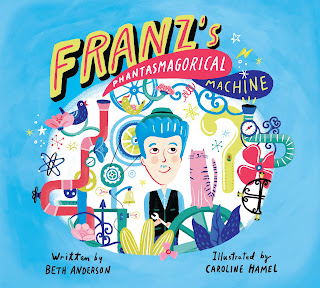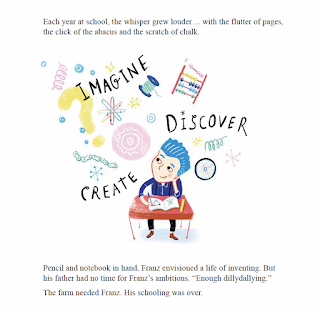I love welcoming author Beth Anderson back to the GROG Blog because she offers a wealth of information, now welcoming her 6th picture book biography into the world, FRANZ’S PHANTASMAGORICAL MACHINE, illustrated by Caroline Hamel, published by Kids Can Press. Congratulations, Beth!
When I chanced upon the word PHANTASMAGORICAL, I knew I’d struck gold! And it fit the story of Franz Gsellmann’s World Machine perfectly with its meaning, composite nature, and whimsical feel!
Word choice is always an essential piece of writing, but with picture books it can make or break a manuscript. English is said to have the largest lexicon of any language in the world. Where other languages might combine words to express specific ideas, English tends toward individual words with nuanced meanings—connotations.
connotation [from dictionary.com]
1.
a.
the associated or secondary meaning of a word or expression in addition to its
explicit or primary meaning…
2. something suggested or implied by a word or thing, rather than being explicitly named or described
With FRANZ’S PHANTASMAGORICAL MACHINE, I struggled to find a
way to showcase the nebulous concept of an inner drive or urge. How could I express
that for kids? “Voice” with the idea of hearing voices wasn’t right. “Urge”
wasn’t either. When I tried “itch,” it worked as “a secondary meaning”…but a
boy with a relentless itch had an “implied” meaning that made it a no-go! I
eventually settled on “whisper” for its quiet summoning, using the word in a
special way.
Word choice can be tricky! But paying attention to connotations allows words to multitask, adds rich vocabulary, and cuts word count. Basically, think about ideas incorporated in words. For example, a word can be cut in both “crowded together” and “the crowd gathered” since crowd contains the concepts of together and gathering.
First and foremost, word choice is key to Show Don’t Tell.
An online thesaurus sits at the
ready on my favorites bar, offering options to get my vision on the page. Still,
I can spend hours finding the right words as I revise a paragraph. A great word
choice can often eliminate an illustration note. Consider the implied differences:
rode vs. pedaled, talk vs. gossip, laughed
vs. snickered vs. giggled. Alternatives to the usual add richness
and meaning. What follows are some of the ways word choices impacted FRANZ’S
PHANTASMAGORICAL MACHINE.
Attitude, mood, and tone. Referring to the machine from the public’s point of view as a contraption conveys attitude, and when it has grown—behemoth. Lollygagging and dillydallying, instead of wasting time, serve the whimsical tone of the story.
Sensory and Imagery Words. Word choices that enhance
visuals and share sounds and smells bring the story world to life, helping kids
immerse themselves in the experience of the characters. Flutter, click,
scratch, jiggled, rumble, roar, whir, vibrated….
Action. Vivid verbs keep the reader’s mind actively moving along with the characters. He zoomed up its elevator, glided down the escalator and marveled at the colorful lights.
Pairs or Repetition. An interesting pair of words can offer contrast or connections. In FRANZ’s story, I used the idea of making the ordinary extraordinary in several spots to establish another layer to the story. A distinctive word can help the reader notice a repeated phrase at beginning and end to tighten an idea that loops back. …eyes twinkled with wonder…
Made up words. Sometimes, there just isn’t the right word to express an idea strongly and succinctly. In LIZZIE DEMANDS A SEAT, I created what I needed with the pair “late-for-church” and “late-for-equality.” In FRANZ, I didn’t realize I’d pushed the limits until the copy editor came back with a few words that weren’t in the official dictionary of the publishing house. I think zinged was accepted without a problem, but not scrumpled, as in …Franz pondered and paced, sketched and scrumpled, fussed and fretted” required a conversation. To me, it was the perfect word for sound and meaning, a combo of scrunched and crumpled, yet different than either. I found it in another dictionary and declared my love for scrumpled. Sometimes a word choice is worth defending. An unusual word can be fun, interesting, or bring special attention to a spot that deserves pondering.
Specifics are golden. Choosing very specific words helps characterization, setting, and makes the story pop. In Franz’s story, it’s impossible for text and art to share the nearly 2000 parts he used to create the machine, so I included specific pieces of the machine throughout to give the reader a sense of the range, immensity, and uniqueness of his endeavor. Hula-Hoops! Horseshoes! A hair dryer! In a repeated line, I popped different specifics into the series of three, changing “pulleys, wheels, and lights” to “motors, wires, and gears.” When I wrote, I used word slips with names of parts so I could rearrange them to play with shapes, functions, sounds, and more. Though the specific words of the phrase changed in that repeated line, the rhythm of the sentence stayed the same. Which brings us to sound….because a word brings more than meaning to the page.
Sounds of Words. There’s so much to play with regarding the sounds of words. I love figurative language like alliteration, consonance, assonance, and onomatopoeia. The rise, fall, and flow of sounds and syllables are vital to a read-aloud. “trinkets and treasures” has alliteration, but also two 2-syllable words. I admit to getting carried away with the sound effects and lost some beauties in cuts for pacing. (Apparently there’s a fine line between enough and excessive, so be careful of overdoing.) Attention to sounds also helps eliminate potential tongue-twisters that arise when reading aloud.
Choosing the perfect word can cut word count, create mood, show
contrast and connections, affect pacing and flow, transform a scene, and make a
title sing. It can take many revisions, but when I finally chance upon that perfect
word and it settles onto the page, I can feel it—down deep inside. Sigh.
Thank you so much, Beth, for this excellent post about word choice! Now I need to go see to my manuscripts...
Twitter • Instagram • FaceBook • Pinterest




.jpg)
Thanks, again, Beth, for being on our blog! Love your writing wisdom!
ReplyDeleteGreat tips for helping stories sing! Thanks, Beth!
ReplyDeleteLove reading these word choices. Thank you, Beth!
ReplyDeleteBeth, thank you for these insightful tips!
ReplyDeleteAh the 'sigh' of finally finding the perfect word! Thanks for the post and wonderful examples!
ReplyDelete